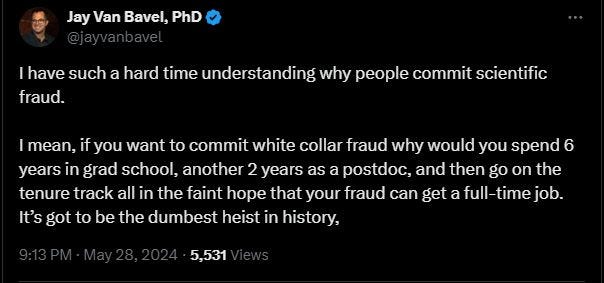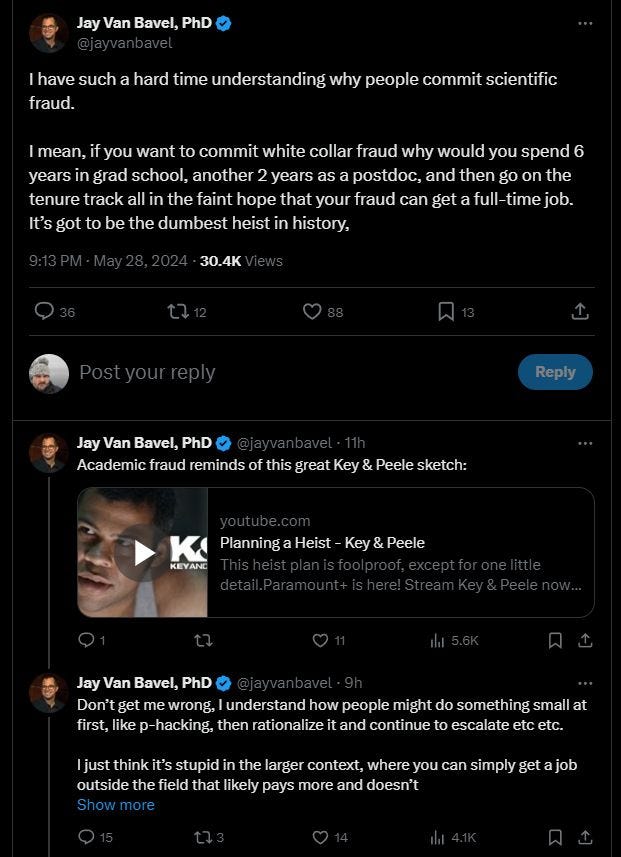Why We Commit Academic Fraud
... and why it's exactly what you'd expect
UPDATE: Jay says he’s joking. See coda.
I like Jay. There’s a lot we don’t agree on, but he’s always stuck me as intelligent, well-intentioned, and decent.
Unfortunately, good people often regard bastardic acts with the same kind of curious detachment we reserve for tigers at the zoo - happy to peer through at them behind the utter certainty of laminated glass, without the slightest inclination to go into the cage and see if the bastard thing will use you as a toothpick.
I respect the sincerity on offer here*, and was not inclined to turn this into a tweet thread that will be swallowed into the morass of porn bots and crypto scams.
So, let’s write it out.
(*UPDATE: Apparently, I do not respect the sincerity. Rather, I have disrespected the parody. You figure it out, I’m not your dad. Again, see end.)
WHY WE CHEAT
The following will be disorganised, because there is so much to say, but I am hoping a consensus will emerge.
The original perspective offered only works if what is more important to you than anything else is finding things out about the world. Only if you have some moral position that values the goals of scientific endeavour. Many scientists do not give a shallow dry fuck about these, not really. They pursue research areas because they are easy, available, or popular. They turn out garbage papers on topics they have no interest in because they are monetizable. Or they regard the whole enterprise as simply a vehicle for their own intensely defective personalities.
Plenty of people with psychopathic traits (or actual psychopathy, or Dark Triad traits, etc. etc.) are attracted to hierarchy games, intellectual games, status games, conflict games. People to manipulate, humiliate, steal from, sabotage, fuck over, and - sometimes - fuck. Academic provides all of these opportunity for human sport, and more. What percentage of the population would be required for these to filter through? 1%? 10%?
Plenty of cynicism in academia starts early. In a truly corrupt department, no PhD student graduates and is conferred without knowing what the score is. In some respects, this is a good self-selection mechanism for people who can handle the fuckery. The honest ones quit or graduate-then-quit. The enablers and willing underlings thrive.
People put up with far worse for far longer in other circumstances. Scientists have a tendency to think scientists are special. They are not. An eight year apprenticeship is also a lot easier if you can cheat your way through it.
We do not catch many frauds. The scariest fact about forensic metascience is that you quickly realise that only the truly disaffected and skill-less manipulators can be rooted out, the people who are eating their pencils. And: the complete dolts are often thriving in multi-decade careers before we find them out. Most people reading this would be better at making science up than the people we catch doing it at present.
Speaking of finding those people out: having located some compromised results, the intrepid researcher who wishes to Right A Great Wrong is not in a position of power. Rather, if you wish to act on a detected fraud, and definitely if you wish other people to also act, the structural barriers erected are legendary, and do not bear repeating. Read… anything else I’ve ever written.
If you do manage to navigate 5. and 6. above, there is a high likelihood that the punishment will be slim. Or absent. Certainly there are few legal repercussions unless you steal the government’s money.
‘Why not get a job that pays better elsewhere’ assumes that those jobs exists, and also that a middle-class life with plenty of young people to torment, government money, and a pension is somehow not Winning The Game. It often is.
Fabricating work makes your life a lot easier. Certainly from the perspective of ‘volume of shit to do on any given work day’, it could be positively cruisy. You have much less to do. You are as prolific as your imagination dictates. Managing four RCTs in a year would be hellish and nearly impossible. Fabricating four RCTs in a year would require some informed planning, and a few nights and weekends.
Much terrible research comes from people who are not on any traditional tenure track, but rather from people who regard ‘publishing’ as an ancillary bonus, a credibility top-up, that maintains their position. There are likely many doctors, for instance, whose medical work is just fine, and they justify their maintenance of a ‘research position’ by throwing in a few papers ontop of an existing role.
A lot of fraud comes from first-authored papers by PhD students and post-docs - they do not ‘graduate’ to the tenure track as honest researchers who then somehow fall off the limb. We often see a pattern where a rolling cast of first and second authors produce suspicious work with the same senior authors. The point of ‘why would you throw away your excellent education in learning to do science right’ is imagining you had one.
People’s ability to rationalize bad acts is legendary, and to lie in service of a Greater Purpose puts a whole new colour on a little bit of rank dishonesty. I think a lot of fabrication is done knowingly in service of an idea that the author/s genuinely think is correct and valuable. We see the low-calorie version of this dynamic when we cite papers we know are complete shit because they support a point we are trying to make.
Stapel, in one of the darkest parts of his book, hints that part of the reason he did what he did (which was whole-arsedly fabricate many dozens of studies) was keeping up with the wonderful glittering results he saw other people produce and didn’t trust. Dishonest science is easier to write, more flexible to edit, and trivial to ‘tune’ to participate in a broader conversation. Bad science crowds out the good.
Many countries have research cultures that treat scientific output as less than sacrosanct. They simply have a different ethos around the importance of honesty and accuracy.
I hope that cover most of it. I think it does. Happy Wednesday.
UPDATE: Here is the full original context.
As irony is dead, and we have killed it, it seems like Poe’s Law has got me yet again. This can remain up, of course, as a monument to my hubris. I apologise for any misunderstanding.
But why the misunderstanding? Why is there even a Poe to be Poe’d here? Why did my dumb arse (and a few dozen other people, who are presumably less dumb and arsed only to the regular degree) not get the joke?
Because this is a real opinion that people hold, of course. This is why everyone reacted the way they did. I’m not sure how it would be a successful satire if there weren’t real people to distort.
Honest people frequently lack the specific kind of imagination required to understand the human gremlins of the world. I have had many conversations with them, where as I am recounting some tale of Great Academic Malfeasance and they get stuck in the ‘but why?’ loop.
“So we think that, after the first paper, they had to produce a second fraud that was kind of … covering fire for the first one. Unfortunately for them, it was also less believable than the first one, because they… Why are you staring at me like that?”
“But why?”
“Why what?”
“Why would you go to all that trouble? Why not just walk away and keep quiet?”
“Lots of reasons.”
“But why?”
“Because people have their pride! Some people feel entitled to be right about anything, just by existing. A lot of these people are academic narcissists, and - to them - questioning them is invalid by definition. They’re not interested in being right, they’re interested in BEING SEEN to be right.”
“But why?”
“Because they don’t want what you want! Their self-interest is the only thing they’re concerned about, ever.”
“But why!?”
At this point, I give up and starting talking about Sportsball, and who has Sported the best this week.
Many, many senior academics come at serious fraud from the perspective of this isn’t really happening. If it isn’t happening, then it doesn’t need to be rooted out of journals, it doesn’t need to be studied, it doesn’t need to be dealt with aggressively. If it’s A Few Bad Apples, then The System will find it out eventually.
(Coincidentally, the same system that has told them that their contributions are special and that they are so very clever and pleasant for being able to navigate it.)
I recommend everyone make any and all performative insincerity on the internet as heavy-handed as possible to avoid future conflagrations. There’s an art to hitting that Tim Pool line, where half the people know you’re joking and the other half are losing their damned minds.
When everyone is losing their mind, you might have fucked up the landing on the joke.




Because a lot of people aren't good at looking at the whole path, they're just looking one step ahead.
More interesting question is why write a tweet that is confessing not understanding something that one is in the position to understand perfectly.